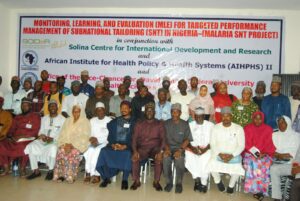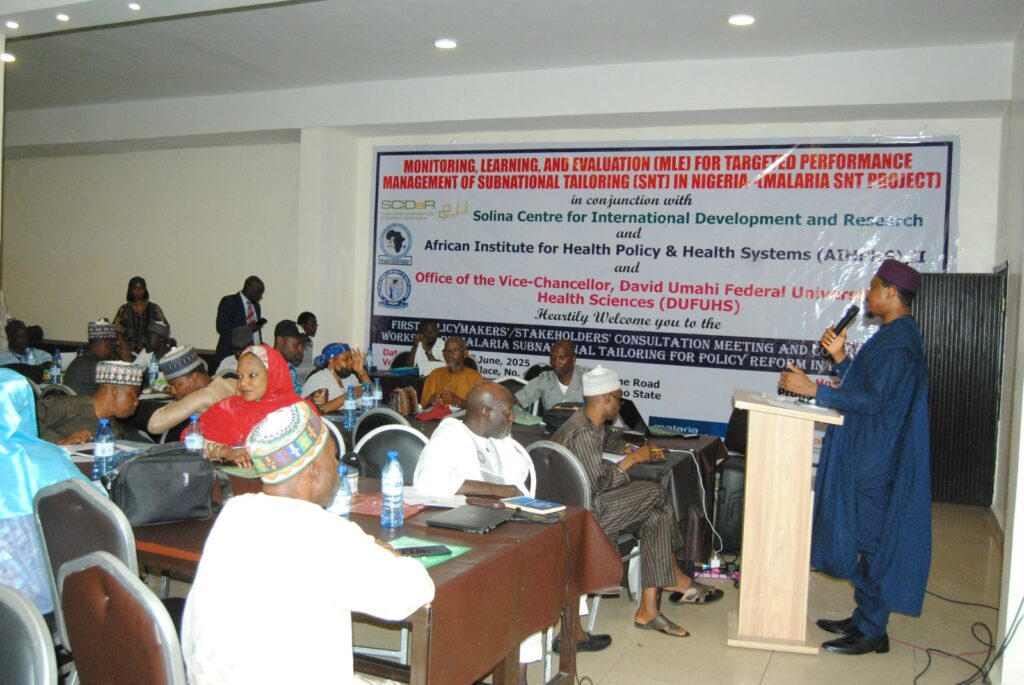By Zainab Musa, Kano
….Health System Expert Advocates For Malaria Subnational Tailoring In Kano
….Says Kano has one of the highest Net distribution rate but high Malaria prevalence in Nigeria
….Poor Antenatal Care Attendance, Poor Adherence to Treatment Guidelines, Others Hamper Implementation of Malaria Interventions
In a bid to ensure a free Malaria society and to critically assess why the implementation of Malaria Interventions does not yield expected results, a health policy and health systems expert Prof. Jesse Uneke, has advocated for a Malaria subnational tailoring in Nigeria, with Kano State taking the lead.
He stated that Kano contributes 10% of National Malaria Prevalence as a result of poor antenatal care attendance, poor adherence to treatment guidelines, inadequate reporting from private health facilities, among others that hamper the smooth implementation of Malaria interventions in Kano state.
He charged Kano State health policymakers to work collaboratively with other stakeholders in a process known as co-creation to address the challenges of malaria burden and improve the interventions in the State, remarking that no other set of stakeholders understand the people and the environment as well as the malaria landscape of Kano better than they do.
The Co-creation workshop/ engagement event tagged “Promoting evidence-informed policymaking and implementation to facilitate Monitoring, Learning, and Evaluation (MLE) for Malaria Subnational Tailoring (SNT) in Kano State”, took place on Thursday,26th day of June 2025, at Tahir Guest Palace, Kano, to discuss the barriers facing malaria elimination in Kano State and ways to address them.
The event was organized by the African Institute for Health Policy and Health Systems, Nigeria and the Office of the Vice Chancellor, David Umahi Federal University of Health Sciences (DUFUHS), Nigeria, in collaboration with Solina Centre for International Development and Research, Bill and Mellinda Gates Foundation, Malaria Consortium, Clinton Health Initiative etc.
In his opening remarks, Prof Jesse Uneke who is the Vice Chancellor of David Umahi Federal University of Health Sciences, Uburu, Nigeria, as well as the Founder/ Director of the African Institute for Health Policy and Health Systems, Nigeria, commended the Kano State Government for the exceptional commitment towards elimination of malaria which is evident from available national data.
He also commended the turn-out of the stakeholders to the event, and emphasized on the importance of co-creation, in understanding the implementation barriers responsible for the persistent high malaria prevalence in Kano State, despite the excellent performance in intervention inputs. He also highlighted the importance of proffering context-specific solutions to address the implementation barriers.
Speaking on the lecture titled: “Promoting evidence-informed policymaking and implementation to facilitate Monitoring, Learning, and Evaluation (MLE) for Malaria Subnational Tailoring (SNT) in Kano State”, Prof. Uneke unequivocally stated that policymaking process is never linear but inherently complex as a result of diverse cultural influences, political factors, administrative bureaucracies, societal norms and attitudes.

He accentuated the need for stakeholders in the malaria control in the State, to look critically at the interventions to identify the reasons why the implementations so far do not translate to expected outcomes.
The Vice Chancellor charged the stakeholders to understand and take seriously the critical role they need to play in the co-creation, remarking that no one else understands the people and the environment as well as the malaria landscape of Kano better than they do.
Furthermore, in a second lecture titled,“Role of Evidence in Policy Process: Insight into malaria control and interventions in Kano State”, another expert in Health Policy and Health Systems, Dr Onyedikachi Chukwu emphasized on the need for policymakers to develop the capacity to always search for best available evidence as well as locally generated evidence, while making public policies.
He also presented the team’s findings of the rapid review of the available evidence on malaria control interventions in Kano State, highlighting some of the shortfalls in the implementation, including poor adherence to National malaria treatment guidelines, poor implementation of intermittent prophylactic treatment policy, poor antenatal care attendance, poor reporting from private health facilities, etc. as reported in the studies.
The workshop witnessed a very robust co-creation session, where the stakeholders worked in groups. Each group brainstormed and volunteered insight on the following critical issues: Capacity of Kano State to adopt and implement sub-nationally tailored malaria elimination interventions; Effectiveness of utilizing SNT-informed approaches in implementing malaria program interventions in Kano State; Achievement of malaria outcomes and identification of the underlying factors contributing to the observed performance in Kano State; Scalable, cost-effective, and sustainable approaches for malaria elimination that can be adapted and implemented in other states with similar malaria burdens across Nigeria; and critical enablers that can enhance the institutionalization of SNT in the target states, and its scale up to other states with similar malaria burdens across Nigeria.
During the event, there were goodwill messages from representatives of the organizations such as: Solina Centre for International Development and Research, Malaria Consortium, and Kano State Hospital Management Board, conveying their unwavering commitment and support of their organizations in any cause that will result to malaria elimination in Kano State, adding that such a co-creation workshop at this time, is a giant step in the right direction towards ensuring that malaria is eliminated in Kano State.
The event was well attended by over sixty (60) stakeholders, mainly health policymakers, Government officials, researchers from Bayero University Kano, officers from; Kano State Malaria Elimination Program, Kano State Primary Health Care Development Agency, Kano State Hospital Management Board, Malaria Consortium Kano State, Civil Society Organizations, Nigerian Union of Teachers, etc.

